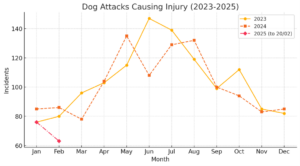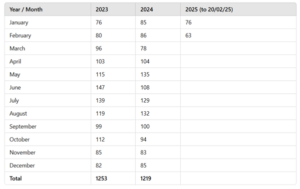Two years after being named Britain’s dog bite hotspot, Liverpool’s attack rates remain stubbornly high, according to police figures revealed by Mersey News Live.
Data released by Merseyside Police in response to our Freedom of Information request revealed the number of dog bites in January 2025 was the same as January 2023, when Merseyside was named as the dog bite capital of the UK.
Last week, a 70-year-old dog owner trying to defend his pet was attacked several times by a German Shepherd in Southport on April 24.
This follows the death of an 84-year-old man from Warrington, who died after being attacked by an XL Bully last month.
In May 2023, the NHS revealed that you are almost 10 times more likely to be bitten by a dog in Knowsley than anywhere else in the UK.
In response to the surge in incidents, Merseyside Police launched the Taking the Lead campaign in July 2023, aiming to curb dangerous dog encounters through informing the public about dog safety.
However, the data revealed by Mersey News Live shows that there has been little change in the rate of attacks.
What does the data show?
The data below, collated by Grace Williams, shows the number of dog bites in Merseyside from 2023 to 2025 (so far).


Despite the XL Bully ban and Liverpool’s safety campaigns, dog bites fell by just 4% from 2023 to 2024.
The data also shows that attacks spike in summertime between May and August.
In January 2023 there were 76 dog bites in Merseyside, a figure that has not changed two years later in January 2025.
Rachel Wesley, EMDR Trauma Psychotherapist and chair/secretary of Saving Saints Rescue UK (large dog rescue charity), said: “I think it’s a multifaceted issue.
“Have dog bites gone up? Or is it that more people are aware of the legislation and because of some of the very sad high-profile cases where humans have died due to a dog bite injury.
“More people, in my experience, are more likely to want to claim against an individual’s pet insurance for a dog bite.
“I’m aware of the statistics, but what’s interesting is it tends to be Jack Russells and the smaller breeds who are more likely to bite than larger breeds.
“People own dogs that they don’t understand. People purchase dogs with genetic history that they don’t understand.
“It isn’t the XL Bully’s that are the issue. It’s the way that the dogs are bred, the way that they’re not given the right socialisation.
“It’s the human owners who aren’t prepared for the dog ownership of that particular breed.”
Rachel said: “I recommend we look to the Czech Republic, that we have dog licensing, a course that people have to go on before they even start to own a dog.”

With stagnant figures and a continued threat to residents, what more can be done to reduce dog bites across Merseyside?
Dangerous Dogs Act
In December 2023, it became illegal under the Dangerous Dogs Act 1991 to breed, sell, advertise, gift and exchange American bully XL.
Restrictions also made it a legal requirement for all XL Bully dogs to be kept on a lead and muzzled when in public.
The ban came shortly after 16 people in 2023 across England and Wales died after being bitten or struck by a dog.
However, many dog owners, charities and organisations disagree with breed-specific banning.
A spokesperson from Dogs Trust, the largest dog welfare charity in the UK, told Mersey News Live: “Dogs Trust shares the public concern regarding the number of incidents involving dogs, and we firmly agree that action needs to be taken to prevent further incidents and to effectively protect the public.
“However, for more than 30 years, Dogs Trust has been calling on Government to overhaul the Dangerous Dogs Act as its current focus on breed specific legislation is not only detrimental to dog welfare, but it is ineffective and does little to protect members of the public.
“Instead, the issue of dog control should be tackled by introducing preventative, breed-neutral legislation that addresses the unscrupulous breeders who are putting profit before welfare, and owners whose dogs are out of control.”
Breed Specific Legislation was introduced in 1991 as part of the Dangerous Dogs Act 1991, restricting the ownership of certain types of dogs.
Breed Specific Legislation (BSL) bans the ownership of five different types of dogs in the UK:
- Pit bull terrier
- Japanese Tosa
- Dogo Argentino
- Fila Braziliero
- The XL Bully
£600,000 in costs
Since the XL bully ban, Merseyside police have spent £600,000 seizing and rehoming dangerous dogs (up to December 2024).
Police officials said: “Reasons for the increase includes increased kennel and veterinary costs, new internal kennels placed at local stations to house more dogs, and new staff to manage them.”
Abdul Shakeel PgDL Law is the director of operations at Nationwide Dog Handlers Ltd, a leading animal handling and removal service operating throughout all major cities and towns in the United Kingdom.
Mr Shakeel said: “We are able to cope with lots of requirements throughout the North East and North West of England.
“What we can see from the bookings that we receive, looking at the statistics in the way in which we are booked for our services, there are much more resources requested throughout Merseyside comparatively to those throughout the rest of the country.
“London is the only exception, but it is London and Liverpool where we see the greatest demand for our services.”
While Liverpool has implemented measures to address dog bites, the slight reduction in incidents and ongoing seasonal spikes indicate that further adjustments are needed.
The effectiveness of breed-specific bans and awareness campaigns remains debated, highlighting the complexity of the issue.
The city’s status as the UK’s dog bite capital is far from resolved.
Listen to the Mersey News Live podcast episode with Rachel Wesley:
If you’d like to join the conversation about dog bites in Merseyside, email us at [email protected], leave a comment below, or tweet us on X @merseynewslive.









